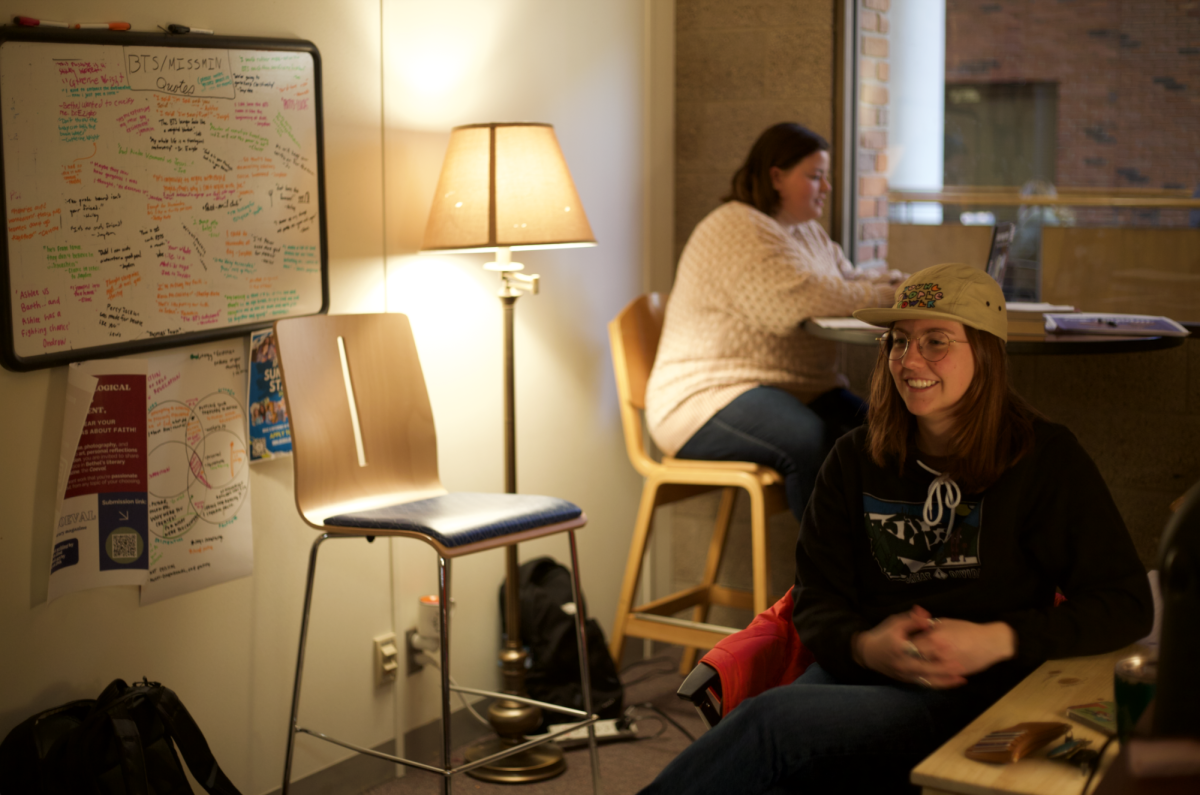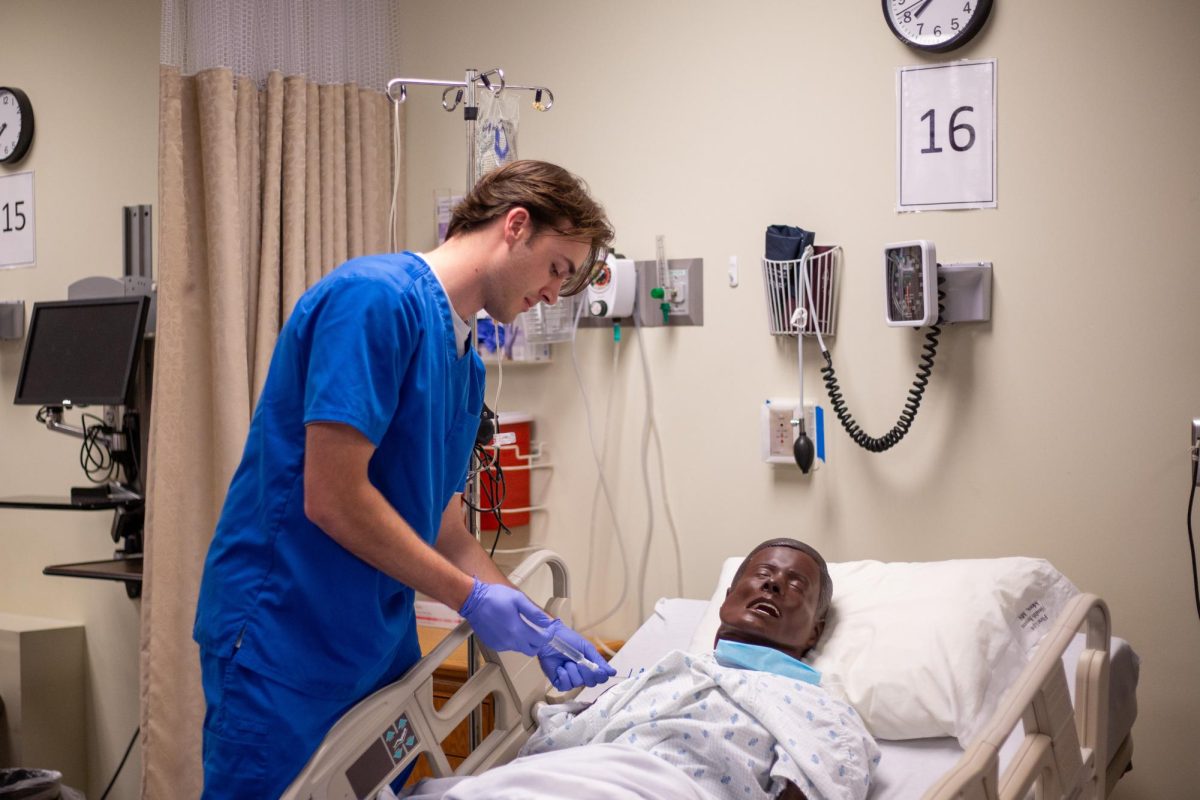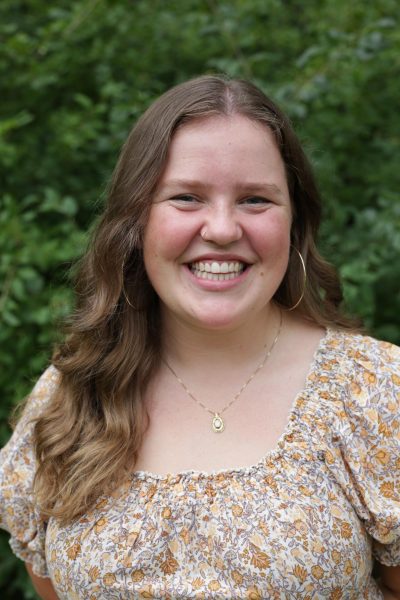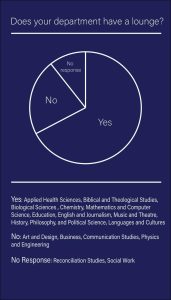
Across Bethel University’s campus, students occupy “third spaces” all day. When they aren’t getting ready in their dorm or participating in class discussions in the windowless rooms of the BAC, students are finding other places to spend their time. People-watching in the Monson Dining Center. Quickly finishing homework in the hidden chairs between the library shelves. Catching up with friends at the bottom of the Egg stairs. These third spaces, a term used to describe places outside of home and work, are important in helping build identities and increase socialization.
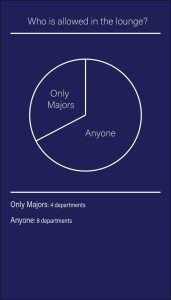
Although many students are satisfied with general spaces like the Brushaber Commons, others spend their time in more hidden, niche spaces: departmental lounges.
Out of the 18 departments on campus, more than half have a space of their own to conduct department-specific activities, provide homework space and give students an area to hang out.
History professor Chris Gehrz recalls that around 10 years ago, Bethel implemented some space planning and wanted to figure out where to place departments displaced by new science facilities. These changes prompted the conversation about how Bethel could create more dedicated spaces for departments that housed more than just faculty offices.
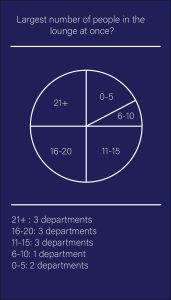
“They’re a place where students can study, they can spend time together, they can have events, they can be at least in proximity to their professors,” Gehrz said. “And so I think that became more of the philosophy.”
Departmental lounges have fostered distinct departmental identities, connected students to their peers and professors and showcased what departments have to offer. Each lounge is different. Some have only a few chairs, while others have space to host events. Some are open to any major, while others are locked behind a keypad. Some have been well-established for many years, while others are brand new. Either way, these spaces give students unique places to work and socialize.
Happy Lab
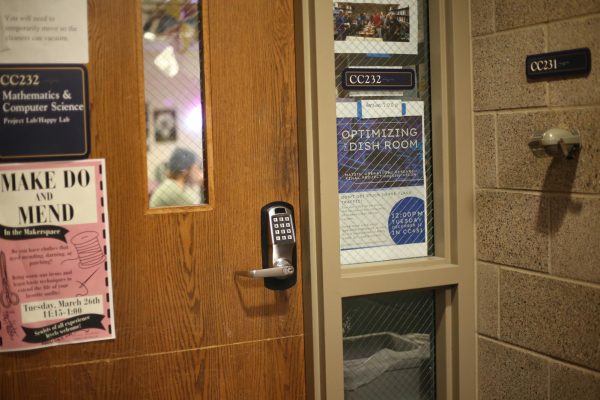
Tucked behind Royal Grounds at the end of the admissions hallway, the math department’s lounge goes unknown to most on campus — away from the eyes of students who haven’t dealt with numbers since high school pre-calc. Senior computer science major Ethan Hall spends a minimum of four hours a day in the Happy Lab. It’s a sanctuary hidden behind a six-digit code given to students when they pass Discrete Mathematics, a 200-level math class. According to Math and Computer Science Department Chair Nathan Gossett, most students value how the Happy Lab is not a public area.
“While some stereotypes are not true, people who are in here, we like to fit the stereotype of math [and] CS people who are kind of introverted,” Hall said. “And so it’s nice to have a space separated from everything where it’s just nice and chill. You know everyone who comes in and out.”
Hall uses the space as a homework spot, an area to talk with professors and a space to play his favorite card game, Magic: The Gathering. The entire back corner has been “colonized” by Hall to store his decks of cards. To keep costs of the game down, Hall will print and cut out cards before slipping them into card sleeves.
On top of being a space for Magic, the Happy Lab is used as a gathering space for the entire department. 12 varieties of pie were strewn across the center table for students to try while celebrating Pi Day. When Math Lab wanted to commemorate the tutor of the pay period, they used to hang full-body photos on the ceiling. To this day, the print-outs maintain a watchful eye from above. Currently, there is a QR code signaling sign-ups for an upcoming chess tournament placed right at the entrance.
Although not meant for everyone, the Happy Lab is clearly a home for many.
HiPPoS Lounge
When the Department of History, Philosophy and Political Science’s mascot went missing at the beginning of the semester, fliers went up, Bethel E-announcements were sent out and word of mouth spread. The stuffed hippo, named Gus after St. Augustine of Hippo, was gifted to the department a few years ago to celebrate the merging of the three departments. The animal choice was fitting because the department names create an acronym spelling out the name of the semi-aquatic mammal from sub-Saharan Africa.
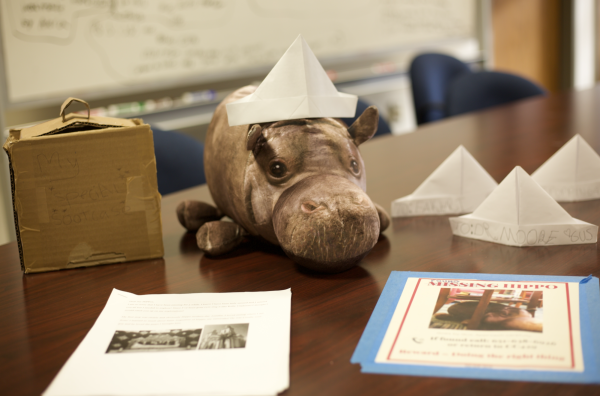
Returned after spring break from a supposed extended vacation, Gus has retaken his place overlooking the HiPPoS lounge, serving as a reminder of the community found in the department that will band together to find a missing stuffed animal.
After departments were moved around in 2019, the HiPPoS took the old education space in the CC400s. Previously filled with cubicles, the department wanted a student space. At first the faculty were intentional about scheduling departmental events so that students knew where the space was and that it could be used. Today, the department still hosts departmental chapel in the lounge twice a year, but it is mostly used as an informal hangout space. With tables and chairs in the middle and faculty offices lining the room, the space is intentional about fostering departmental community.
“I feel like I actually know my students better just because we get spontaneous conversations,” Gehrz said, “and because we get an office mascot that goes missing and everyone’s concerned and it seems silly, but we kind of care about it. I’m not sure that would happen with the previous kind of space arrangement.”
Political science clubs use the space for meetings and students of all majors study in the red armchairs overlooking Kresge Courtyard. Gehrz appreciates that it is not just HiPPoS majors who use the space. Sometimes the whiteboard next to his office shares information on the upcoming Pi Sigma Alpha political science honors society meeting. Other times it is covered in biochemistry notes or biblical Greek.
“It’s sort of this microcosm of a liberal arts university,” Gehrz said. “You walk in and you never know what people are studying for or talking about or planning for.”
BTS Lounge
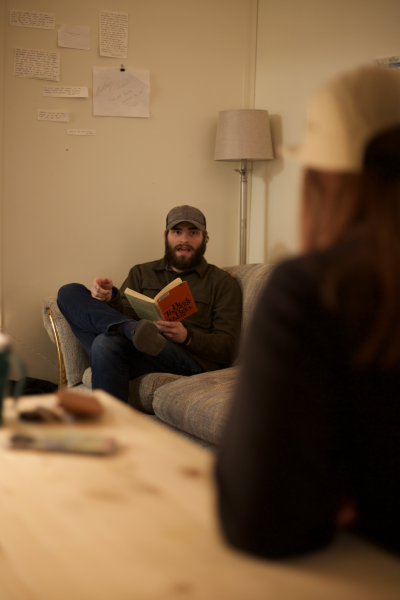
After budget cuts left an empty office along the biblical and theological studies hallway, junior BTS and missional ministries major Grace Johnson saw the future of a study space in the empty room. Shortly after, BTS Department Chair Erik Leafblad sent an email to Johnson and a few other students explaining how he wanted to make just that. Without using any departmental funds, Johnson and other members of the department have contributed items to make the space more homey and welcoming. There’s the table and coffee maker stolen from Leafblad’s office. A row of almost-disposed Christian Scholar’s Review books that now serve as decoration. A Christological collage bearing depictions of Jesus across cultures. If students step deeper into the space and close the door, the printed-out faces of all the department’s professors stare back.
To get people into the space, the department started hosting a coffee hour Tuesday mornings. Then some missional ministry students formed a community group that met inside the room on Wednesdays. Now, so many students use the space that it doesn’t require any formal programming.
“It’s meant to be a study space, but like it’s really just a communal hangout space,” senior BTS and missional ministries major Jammin Henry said. “If you want to get work done, usually this is not the place to do it.”
That sense of community has been really important to Johnson. Last year, she felt like she didn’t know many people in her majors — at least, people she could call her friends. Now the BTS lounge provides a shared physical space for students to have theological discussions, drink coffee and — in one instance — call their crush in front of a captivated audience.
“This space has provided just a spot for people to come together,” Johnson said.
Biology Student Lounge
In any given biology class, chances are there aren’t many true biology majors sitting in lectures and participating in labs. As a service department, biology classes are full of biokinetics, nursing, biochemistry and neuroscience students. Associate Professor of Biology Melissa Cordes says that this makes it easy for biology students to lose their cohort mentality and feel “diluted.” Creating a student lounge has helped change this.
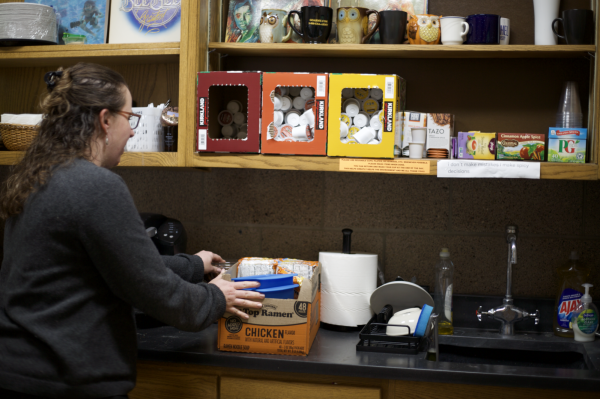
After a professor retired last spring and left an “ancient” refrigerator in the hallway, Cordes liked the idea of creating a space for the fridge. It would be a helpful place to store lunches while conducting summer research. So the biology department converted an old office located in their hallway of the BAC basement into a lounge equipped with a new fridge, a toaster, a microwave, a Keurig and — most importantly — snacks.
The space accompanied some work tables in the biology hallway that often went unused. But enticed by the updated area — a new whiteboard to study organic chemistry on and some new chairs — students started stopping by. The once-empty tables are now almost always full.
“It’s meant to be a gathering place that doesn’t require an event, doesn’t require an RSVP,” Cordes said. “It’s just a casual spot for them to hang out.”
Since the creation of the lounge, Cordes has grown closer with students, even some she has never taught before. She is diligent, making sure the oat milk creamer in the fridge and the hot cocoa on the counter are stocked.
The space is made brighter by new lighting, a framed owl poster on the wall and a plant cell model lit up to look like stained glass. Even these little changes have helped the biology department grow closer while giving their students a dedicated space.

![Nelson Hall Resident Director Kendall Engelke Davis looks over to see what Resident Assistant Chloe Smith paints. For her weekly 8 p.m. staff development meeting in Nelson Shack April 16, Engelke Davis held a watercolor event to relieve stress. “It’s a unique opportunity to get to really invest and be in [RAs’] lives,” Engelke Davis said, “which I consider such a privilege.”](https://thebuclarion.com/wp-content/uploads/2024/05/041624_KendallEngelkeDavis_Holland_05-1200x800.jpg)















